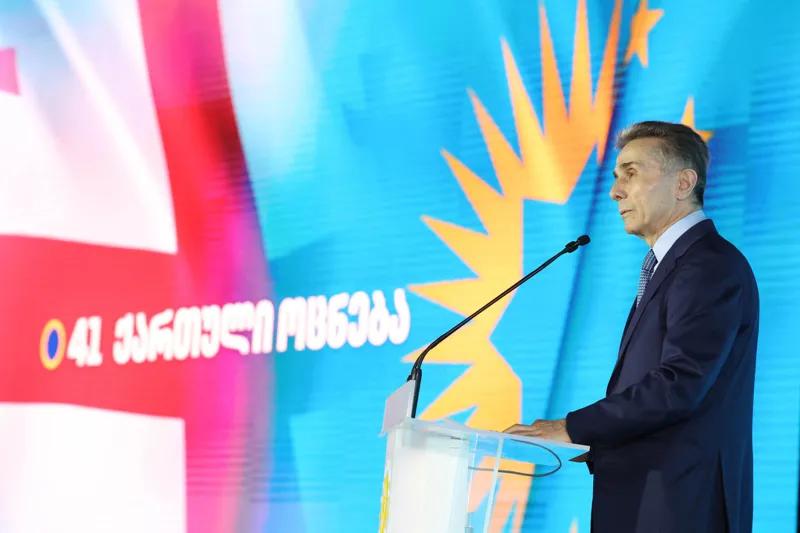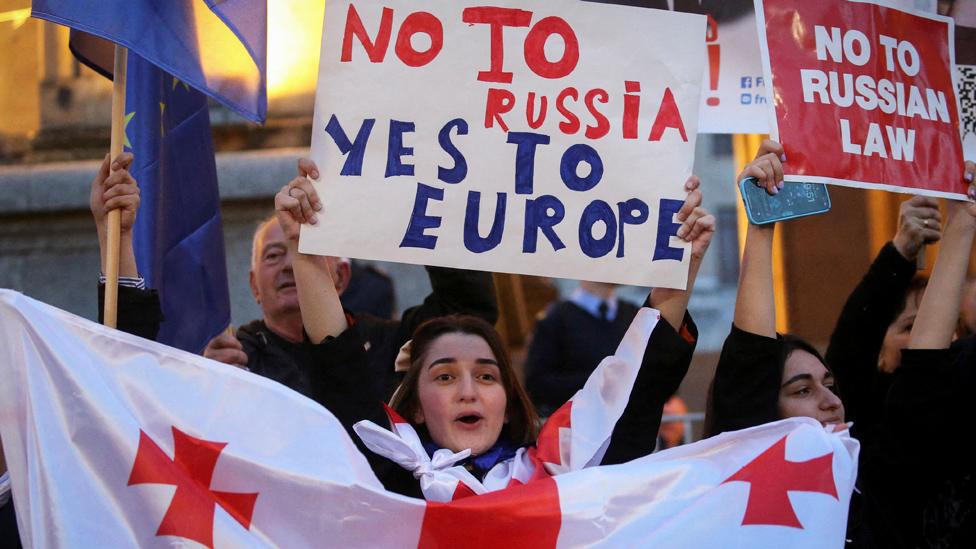Georgian ruling Dream leader's address sets the tone for pivotal 2024 parliamentary polls GD’s campaign focuses on sovereignty & nationalism
As Georgia prepares for its decisive parliamentary elections on October 26, 2024, Bidzina Ivanishvili, founder and honorary chair of the ruling Georgian Dream (GD) party, has launched the party’s campaign with a fervent speech that emphasizes the party’s commitment to peace, stability, and national dignity. The October election is crucial for Georgia, a key player in the South Caucasus and an important strategic and economic partner for Azerbaijan, hosting vital oil and gas pipelines and the Baku-Tbilisi-Kars railway to the Western markets.
On July 16, Ivanishvili addressed his supporters at the opening of the party’s new central office, setting the stage for a contentious election season. His speech centered on the need to defeat what he called the "Global War Party," an alleged coalition of foreign and domestic actors he accuses of pushing Georgia toward conflict. He framed the upcoming election as a referendum between peace and war, stability and chaos, and national dignity versus foreign subjugation.

The aspiration of the “Global War Party” is clear. Since they are sure that we will not go to war and we will not sacrifice Georgia to share Ukraine’s fate, they are making the last attempt to bring back into the government the agents’ network, the collective National Movement, which will take this step as soon as they are tasked, Ivanashvili said, alleging that that is why “they are lobbying for the old and the new National Movement – Saakashvili, Gvaramia, Zurabishvili, Khazaradze, Gakharia, Bokeria, and other politicians without a motherland who will subscribe to any order they receive”.
“Either you fight, or you leave power” – this is a totally unacceptable proposal, and the Georgian people will give a clear answer to it on October 26, he concluded.
A campaign rooted in sovereignty & opposition to foreign influence
Ivanishvili’s rhetoric was particularly pointed against the opposition United National Movement (UNM) and its allies, whom he blames for the 2008 war with Russia and for trying to undermine Georgia’s sovereignty. He accused these groups of being agents of foreign powers, particularly the United States and the European Union, and warned that their return to power would spell disaster for Georgia.
“Georgia should be governed by people who are elected by Georgians. From 2004-2012, we were governed by a foreign-appointed revolutionary committee. They came to power as a result of an NGO-led revolution. The bloody regime that was established showed us the price of this mistake. Some think the reason was Mikheil Saakashvili’s sadism and lack of patriotism. All of this was ordered by their patrons from abroad. Those very politicians who endorsed those policies now portray Saakashvili and his cronies as innocent. The recent resolution of the European Parliament is one example.
“When we ended UNM’s bloody regime, I thought my mission was done. But it was not enough: We still have to fight for our independence and sovereignty. I personally continue that struggle to fully restore our nation’s sovereignty,” the Georgian billionaire magnate alleged.
“This will be a referendum between war and peace,” Ivanishvili further declared. He asserted that the Georgian Dream (GD) party was the only force capable of maintaining peace and ensuring Georgia’s European future. Ivanishvili also pledged to bring to justice those responsible for past conflicts and to continue resisting foreign pressures that threaten Georgia’s independence.
Addressing past and present political tensions
Ivanishvili’s speech also touched on recent controversies, such as the protests against the approval of the “foreign agent” law. This law, which critics argue is a tool to suppress civil society and opposition groups, has been a flashpoint in Georgian politics. Ivanishvili defended the law, claiming it is necessary to expose and counter foreign influence.
He also referenced the broader geopolitical context, particularly the war in Ukraine. Ivanishvili suggested that global and regional interests are currently aligned against Georgia but expressed confidence that these pressures would subside once the conflict in Ukraine ends. He speculated that a Republican victory in the next US presidential election could accelerate this process.
Prospects and campaign promises
Looking ahead, Ivanishvili presented the election as a crucial turning point for Georgia. He emphasized the importance of securing a constitutional majority to implement the party’s agenda fully. This includes ending what he described as the “agents’ network” and ensuring that Georgia remains on a path to European integration.
Ivanishvili’s speech culminated with the introduction of the Georgian Dream’s campaign slogan: “With Peace, Dignity, and Prosperity to Europe.” He promised that the GD would work tirelessly to preserve Georgia’s sovereignty and dignity, ultimately leading the country into the European Union by 2030.
Key points from Ivanishvili’s address:
Sovereignty and Governance: Ivanishvili emphasized that Georgia should be governed by Georgians, not foreign-appointed officials, and criticized the previous government for its foreign ties.
Global War Party: He reiterated his belief in a global conspiracy to destabilize Georgia, linking NGOs and opposition parties to foreign interests.
Foreign Agent Law: Ivanishvili defended the controversial law, arguing it is necessary to protect Georgia from foreign influence.
Ukraine war and geopolitics: He connected the war in Ukraine to Georgia’s political situation, suggesting that current pressures would ease once the conflict ends.
European integration: Ivanishvili reaffirmed his commitment to leading Georgia into the EU by 2030, framing the election as a crucial step in this journey.

Conclusion
As Georgia heads into a critical election season, Ivanishvili’s speech underscores the high stakes involved. His focus on sovereignty, national dignity, and resistance to foreign influence will likely resonate with many voters. However, the accusations against the opposition and the framing of the election as a battle between peace and war will also polarize the electorate. The outcome of this election will shape Georgia’s political landscape and its future relations with both regional and global powers.








